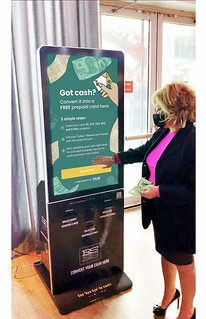
PREV ARTICLE
NEXT ARTICLE
FULL ISSUE
PREV FULL ISSUE
REVERSE ATMS ARE COMING FOR OUR CASHIn the I'm-not-dead-yet-but-on-my-way department, reverse ATMs are becoming a thing. Like a CoinStar machine for folding money, these babies accept cash and spit out a prepaid card. -Editor
Cash has been in decline for a while. In 2019, currency was used in 26% of consumer payments, a sharp decline from 40% in 2012, according to the Atlanta Fed. And the COVID-19 pandemic further encouraged a nationwide push away from physical currency, in part because of sanitary concerns and convenience. The shift is fodder for the rise of the reverse ATM. Jim Mohs, associate professor at the University of New Haven, told the Washington Examiner that the growth in popularity for this new breed of ATMs is relatively fresh. Still, he noted that despite only first learning about their existence recently, he has seen two of them while out and about in Connecticut over the past month or so. One was at a retail location, and the other was in a restaurant.
With these new ATMs, users deposit the cash they have on them, which is then placed on plastic cards that they receive and can be used to spend. The idea comes as cash-only stores and merchants are quickly becoming replaced with cashless and card-only locales. Reverse ATMs might be costly to purchase and maintain for businesses and venues such as hotels, casinos, amusement parks, and sports stadiums, where they are growing in popularity. Yet an increasing number of businesses are starting to see that the benefits outweigh the negatives, such as user fees at some of the machines. Naushervan Beg, a partner and business development executive at Wavetec, which sells reverse ATMs, told Axios that reverse ATMs are becoming a competitive business space.
Has anyone seen one of these in the wild? They've apparently been around for a while. The image above comes from a 2020 article. These disposable money cards could be a partial solution to the problem of anonymity with credit and debit cards, which are directly tied to an individual. I could take cash from my bank's ATM, put it in a reverse ATM and buy my burritos anonymously. Of course, someday bank ATMs could dispense anonymized prepaid cards too. But while tracing transactions would be much harder, with subpoenas law enforcement probably could still track you down to inquire about your purchase of plastic sheeting, a gun, a shovel, a Sawzall and three bags of lime. But as a selling point to anonymity-craving customers, banks could go the way of Apple and other tech firms that use nearly unbreakable encryption that they don't keep a key for, requiring the resources of a nation-state to crack. Found via News & Notes from the Society of Paper Money Collectors (Volume VIII, Number 46, May 2, 2023). Thanks! In another example of the disappearance of cash, here's what happened when I tried to pay cash at a local fast food restaurant at lunch Saturday. My tab was $10.34. I offered to add four cents to my $20 "if that's not too confusing." The young cashier said she could handle it, but after handing her the bill and coins she then looked puzzled, handed back the coins and rang up the sale. But apparently she entered the bill as a $10, then entered another $10. So far so good. The cash register correctly computed my change - $9.66. But she was still puzzled and brought over her manager, an older woman I figured would just tell her to "give the man $9.66." But no - they talked it over and then handed me a $10 and a quarter ($10.25). I just thanked them and walked away. I'd had enough. Now, I'm no Luddite and do use credit and debit cards frequently. And while I wouldn't mind just paying thru the store's app, I was turned off by a bad experience at my local 7-11. One morning they rang up my purchases wrong, and after much back and forth and button pressing and machine beeping, they got the total right. But what I didn't realize at first was that they hadn't successfully cancelled the original wrong sale - they just added a new charge on top, basically picking my pocket for several dollars. It took weeks to straighten that out and get my money back. So I still use the app to get rewards, but I pay with cash so I know what I'm handing over. -Editor
To read the complete articles, see:
Wayne Homren, Editor The Numismatic Bibliomania Society is a non-profit organization promoting numismatic literature. See our web site at coinbooks.org. To submit items for publication in The E-Sylum, write to the Editor at this address: whomren@gmail.com To subscribe go to: https://my.binhost.com/lists/listinfo/esylum All Rights Reserved. NBS Home Page Contact the NBS webmaster 
|
